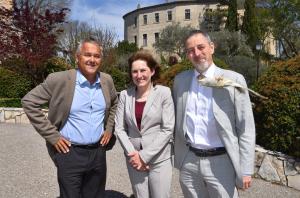Now DEMO ...
DEMO will be a different machine, demonstrating electricity production and tritium self-sufficiency, with a level of performance expected to go well beyond that of ITER. Our approach to the design of DEMO is based on what I would call a "reasonable extrapolation" of ITER. We know that we will face some serious challenges ... take for instance the blanket modules inside the vacuum vessel. In ITER, they are designed to be "maintained" in case one module fails; in DEMO, due to the neutron fluence, the whole blanket will need to be replaced periodically.
Whereas in ITER replacing the whole blanket (which is not foreseen) would take probably two years, in DEMO we will have to do it without significantly hampering the availability of the machine. This means developing concepts that will allow us to do it in just a few months ...
Do the pre-conceptual studies for DEMO benefit from the experience already acquired in ITER?
One of the lessons learned from ITER is that we should not seek to optimize systems individually but focus intensely on the interactivity between systems. For instance optimizing the coolant is not only a matter related to the optimal operation of the breeding blankets, but one that also impacts the choice of materials, the penetrations through the walls, safety, other systems, plant efficiency, and costs ... to name just a few.
In a few words, what was the outcome of EUROfusion's General Assembly?
We had a very busy agenda this year. First we discussed the future of JET, for which deuterium-tritium experimentation is planned in 2019. In the context of Brexit, this requires an extension of the arrangements for using the facility; at the meeting we made useful steps in that direction. We also made important decisions to upgrade European tokamaks and some other facilities in order to progress a crucial question for fusion—that of the power exhaust, i.e., the control of power by the divertor. In Europe we will be able to explore the broadest set of options in that area, which will provide essential information to operate ITER and prepare DEMO.


